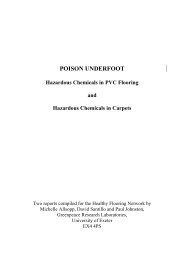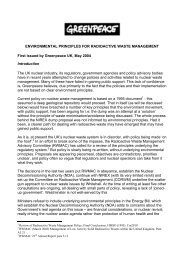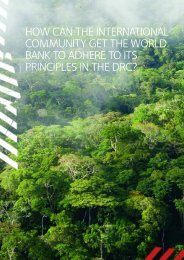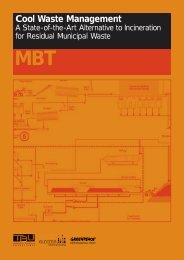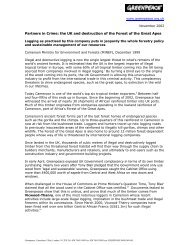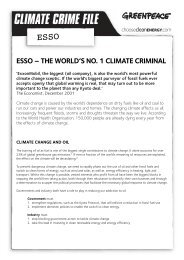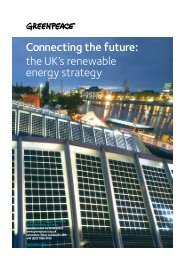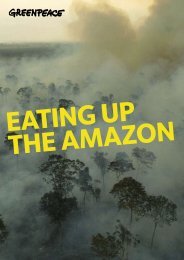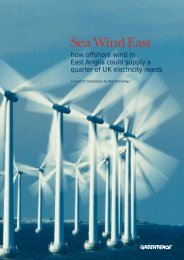The Real Green Revolution - Greenpeace UK
The Real Green Revolution - Greenpeace UK
The Real Green Revolution - Greenpeace UK
You also want an ePaper? Increase the reach of your titles
YUMPU automatically turns print PDFs into web optimized ePapers that Google loves.
National and international development<br />
agencies are a second force that is<br />
encouraging the adoption of organic<br />
production in the South. Here the primary<br />
concerns are with enhancing food security,<br />
increasing farmers’ incomes and halting (or<br />
reversing) environmental degradation. Such<br />
projects often, but by no means always,<br />
focus on maximizing use of local resources<br />
and knowledge in order to achieve these<br />
aims. Some projects promoted under this<br />
agenda will be wholly organic, but the<br />
majority of such projects are neither<br />
explicitly, nor wholly, organic, although they<br />
may incorporate significant elements of<br />
organic practice within them.<br />
<strong>The</strong> role of organic farming as a ‘development<br />
strategy’ has been gaining increasing cre d i b i l i t y<br />
in recent years. In 1996 a UNCTAD re p o rt<br />
highlighted the role that organic agriculture<br />
can play in trade, environmental impro v e m e n t<br />
and social development in the third world.<br />
Although the re p o rt expressed some misgivings<br />
about economic viability and technical<br />
f e a s i b i l i t y, it concluded that:<br />
‘Organic production has an undeniable edge<br />
over conventional farming in terms of its<br />
beneficial impact on the environment and<br />
human health. Moreover, it can also<br />
contribute to higher incomes, better food<br />
security and creation of employment.’<br />
(UNCTAD, 1996)<br />
<strong>The</strong> report also commented upon the<br />
‘flawed’ basis upon which comparisons<br />
are made between conventional and organic<br />
agriculture, stating that:<br />
‘if an internalisation of environmental and<br />
social costs and benefits were to take place,<br />
organic farming would appear economically<br />
justifiable’ (ibid.).<br />
Since then the role of organic agriculture has<br />
been recognised by FAO, who in 1999<br />
included it within their sustainable<br />
agriculture programme , recognising that: 16<br />
‘it plays an important role in developing<br />
innovative production technologies,<br />
providing new market opportunities for<br />
farmers and processors, and generally<br />
focusing attention on environmental and<br />
social concerns. COAG (the FAO’s<br />
Committee on Agriculture) will consider the<br />
need for an FAO-wide, cross-sectoral<br />
programme on organic agriculture that<br />
would provide information and discussion<br />
forums on production and trade, supply<br />
advice and technical assistance, develop<br />
standards and use pilot projects to improve<br />
organic farming techniques.’<br />
(Eric Kueneman, 17 1999)<br />
Since adopting organic agriculture within its<br />
remit, the FAO has developed a medium<br />
term plan intended to raise the profile and<br />
support the development of organic farming<br />
systems through developing dissemination<br />
and networking vehicles, commissioning<br />
studies, and providing effective decision<br />
support tools (FAO, 2001). 18 However, the<br />
FAO’s support for organic farming maintains<br />
an element of caution. For example, in<br />
several publications they argue for partial<br />
conversion to offset potential loss of yields.<br />
Other government-financed development<br />
agencies are also taking a keen interest in<br />
organic systems as a tool for development.<br />
In the <strong>UK</strong>, DfID recently commissioned the<br />
Henry Doubleday Research Association<br />
(HDRA) to undertake reports into farmer<br />
demand and potential for development of<br />
organic farming in sub-Saharan Africa<br />
(Harris et al.. 1998) and on management<br />
of manure in the Kenyan Highlands (Lekasi<br />
et al.., 1998). A forthcoming DfID handbook<br />
for advisors will contain information on<br />
evaluating organic projects. A further<br />
publication on the role of ‘socially<br />
responsible’ business as a development tool<br />
will include a chapter on organic production<br />
(Agroeco, 2001, van Elzakker, pers. comm.)<br />
22


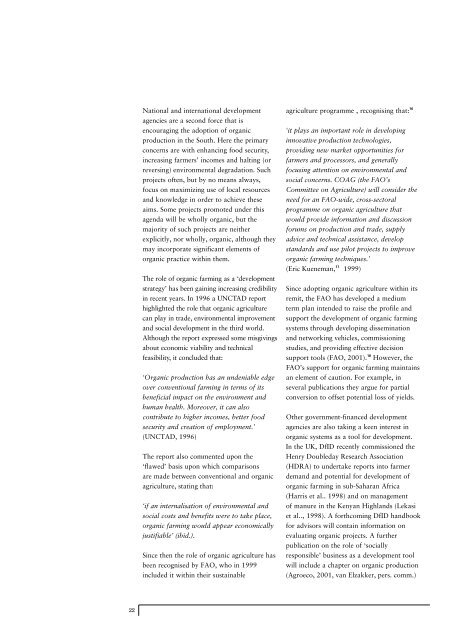
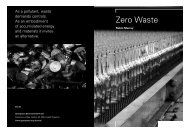
![[2007] EWHC 311 - Greenpeace UK](https://img.yumpu.com/22079793/1/184x260/2007-ewhc-311-greenpeace-uk.jpg?quality=85)
